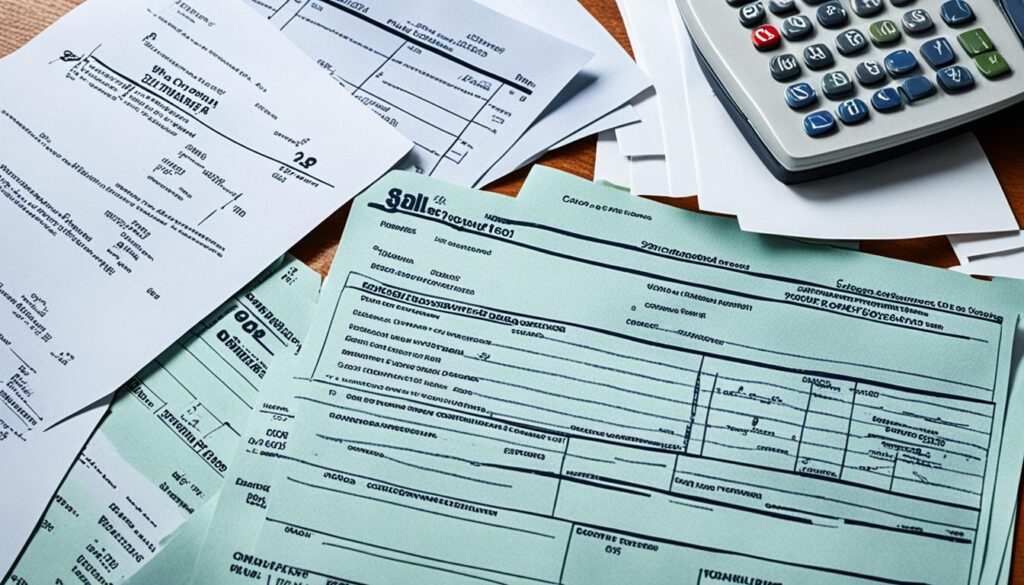Bankruptcies or evictions on your credit report can be overwhelming. This guide will help you dispute or remove these records. We’ll show you how to challenge unlawful evictions and address bankruptcy issues.
Our goal is to improve your credit score and rental chances. You’ll learn to tackle credit reporting complexities head-on.
Knowing your rights is key to disputing credit report errors. This guide offers a clear path through credit reporting challenges. You’ll gain tools to shape your financial future.
Key Takeaways
- Learn how to identify errors in bankruptcy and eviction records
- Understand your rights under the Fair Credit Reporting Act
- Discover the process to dispute inaccurate information
- Find out how to gather evidence to support your claim
- Learn to write an effective dispute letter to credit bureaus
- Understand the timeline for credit bureau responses
- Know what to do if your dispute is rejected
Understanding Bankruptcy on Your Credit Report
Bankruptcy can greatly affect your financial future. It’s important to know how it appears on your credit report. Both bankruptcy and credit repair for eviction issues can harm your creditworthiness.
Types of Bankruptcies Reported
Two main types of bankruptcies can show up on your credit report:
- Chapter 7 Bankruptcy: Liquidation of assets to pay off debts
- Chapter 13 Bankruptcy: Debt reorganization and repayment plan
How Long Bankruptcies Stay on Credit Reports
The duration of a bankruptcy on your credit report depends on the type:
| Bankruptcy Type | Duration on Credit Report |
|---|---|
| Chapter 7 | 10 years from filing date |
| Chapter 13 | 7 years from filing date |
Impact of Bankruptcy on Credit Scores
Bankruptcy can severely damage your credit score. Your score may drop by 100 to 200 points. This decrease can make getting loans, renting apartments, or finding jobs difficult.
It’s crucial to check that bankruptcy info on your credit report is correct. Like fighting wrongful rental history entries, fixing errors can help your credit recover faster.
“Bankruptcy should be a last resort. Explore all other options first, as the effects can be long-lasting and severe.”
Reviewing Your Credit Report for Accuracy
Checking your credit reports is vital for financial well-being. Get free reports from Equifax, Experian, and TransUnion. These documents show your complete credit history.
Examine eviction records and bankruptcy entries closely. Check for errors in dates, amounts, or account statuses. Verify all rental-related information to fix incorrect tenant screening data.

- Personal information (name, address, Social Security number)
- Credit accounts (credit cards, loans, mortgages)
- Public records (bankruptcies, evictions, liens)
- Inquiries (companies that have accessed your credit report)
Mark eviction reporting errors for dispute. These mistakes can affect your future rental options. Note all discrepancies to support your claims.
| Credit Report Section | Common Errors | Impact on Credit |
|---|---|---|
| Personal Information | Misspelled name, wrong address | Minimal |
| Credit Accounts | Incorrect balance, late payments | Significant |
| Public Records | False evictions, outdated bankruptcies | Severe |
| Inquiries | Unauthorized credit checks | Moderate |
Quick action on errors protects your credit score and rental chances. Review your reports often to catch and fix mistakes quickly.
Legal Rights Under the Fair Credit Reporting Act
The Fair Credit Reporting Act protects consumers’ rights in credit reporting. It’s vital for those disputing eviction tradelines or facing tenant blacklisting issues.
Your Right to Dispute Inaccurate Information
You can challenge any wrong information on your credit report. This includes disputing bankruptcies, evictions, or other negative items that may be wrong or old.
Time Limits for Credit Bureaus to Respond
Credit bureaus must address your dispute within 30 days. Sometimes, this can stretch to 45 days. They should investigate your claim and check with the original source.
Consequences for Credit Bureaus Failing to Comply
Credit bureaus face serious penalties if they break the law. These can include fines and legal action. Landlords using consumer reports must also follow FCRA rules or risk consequences.
| FCRA Violation | Potential Consequence |
|---|---|
| Failing to investigate disputes | Fines up to $4,111 per violation |
| Reporting inaccurate information | Legal action by consumers |
| Not providing free annual credit reports | Federal Trade Commission enforcement |
Knowing your rights is key during tenant blacklisting disputes. Stay informed and firm when dealing with credit bureaus. This ensures you’re treated fairly.
Gathering Evidence to Support Your Dispute
Solid evidence is crucial when challenging unlawful eviction records or seeking credit repair. The right documents strengthen your case and boost your chances of success.

Begin by collecting court records related to your bankruptcy or eviction. These official documents can prove errors in dates, amounts, or case details. Gather all correspondence with landlords or creditors.
Emails, letters, and texts can show attempts to resolve issues or prove payments. Financial records are vital. Bank statements, canceled checks, and receipts demonstrate your payment history.
For eviction disputes, lease agreements and move-out notices can be valuable. Organize your evidence chronologically to tell a clear story when submitting your dispute.
| Document Type | Relevance |
|---|---|
| Court Records | Verify case details and outcomes |
| Correspondence | Show communication efforts |
| Payment Proofs | Demonstrate financial responsibility |
| Lease Agreements | Clarify rental terms and dates |
Focus on quality over quantity. Choose documents that directly address the inaccuracies in your credit report. This approach will make your dispute more effective.
Strong evidence is the foundation of a successful credit report dispute. Take time to gather and organize your documents carefully.”
A well-prepared evidence package sets the stage for a compelling dispute letter. It’s the first step towards clearing your credit record.
How to Dispute Eviction on Credit Report
Evictions can seriously damage your credit score. To protect your finances, follow these steps to dispute an eviction on your credit report. Start by getting copies of your credit reports from all three major bureaus.
Review the reports carefully for any errors related to the eviction. If you find inaccurate information, gather evidence to support your case. This may include lease agreements, payment records, or court documents.
Draft a dispute letter to the credit bureaus. Explain why the eviction entry is incorrect and include your supporting documents. Send your dispute via certified mail to ensure delivery.
The credit bureaus have 30 days to investigate and respond. If they can’t verify the information, they must remove the eviction from your credit report.
You can also contact your former landlord or property management company directly. Ask them to update or remove the eviction record if it’s inaccurate. They may agree to remove it if you pay back rent.
If your dispute is rejected, don’t lose hope. You can file a complaint with the Consumer Financial Protection Bureau or seek legal advice. Keep fighting to remove negative items from your credit report.
- Get your credit reports
- Review for eviction errors
- Gather supporting evidence
- Write a dispute letter
- Send via certified mail
- Follow up if necessary
By following these steps, you can challenge an eviction on your credit report. This may help improve your credit score. Stay proactive and keep detailed records throughout the process.
Writing an Effective Dispute Letter
A powerful dispute letter is vital for fighting wrong rental history entries. It can quickly correct inaccurate tenant screening data. A well-crafted letter makes a big difference in fixing errors.

Key Elements to Include in Your Letter
Keep your dispute letter clear and brief. State your purpose and identify the information you’re disputing. Include your full name, address, and relevant account numbers. How to Dispute Bankruptcies on Credit Report
Explain why the information is wrong. Provide any evidence that supports your claim. This helps strengthen your case for correction. How to Dispute Bankruptcies on Credit Report
Sample Dispute Letter Template
Addressing the Letter to the Right Department
Send your letter to the credit bureau’s dispute department. This ensures it reaches the right people. They can fix inaccurate tenant screening data.
Double-check the address before mailing. This helps avoid delays in processing your dispute. Quick action can lead to faster results.
Submitting Your Dispute to Credit Bureaus
Submitting a dispute to credit bureaus is vital for fixing eviction reporting errors. This process involves documenting and presenting your case to correct inaccuracies. Careful preparation is key to a successful dispute.
Credit bureaus offer three main methods for disputing eviction tradelines:
- Online submission
- Mail-in disputes
- Phone disputes
Online submissions are often the quickest way to start. Each bureau has a dedicated portal for filing disputes. When disputing eviction tradelines, provide clear evidence supporting your claim.
For mail-in disputes, send a detailed letter with supporting documents via certified mail. This ensures you have proof of delivery. Phone disputes work for simple issues but aren’t ideal for complex eviction cases.
| Dispute Method | Pros | Cons |
|---|---|---|
| Online | Fast, convenient | Limited space for explanations |
| Detailed explanations possible | Slower process | |
| Phone | Immediate assistance | Not suitable for complex disputes |
Keep copies of all correspondence and set reminders to follow up. Credit bureaus have 30 days to investigate and respond to your dispute. This timeline helps address eviction reporting errors efficiently.
Following Up on Your Dispute
Tracking your dispute status is crucial. Most credit bureaus offer online portals or toll-free numbers for updates. Keep an eye on these to know when action is needed.
Handling a Rejected Dispute
Don’t lose hope if your dispute gets rejected. Review the rejection reason carefully. Sometimes, additional documents or clarification can turn things around.
Persistence is often key in the tenant blacklisting dispute process. You have options to continue your credit repair for eviction issues.
Seeking Further Investigation
If initial efforts fall short, request further investigation. Draft a detailed letter explaining why you believe the decision is incorrect. Include any new evidence you’ve gathered.
Send this to the credit bureaus and the company that reported the bankruptcy. Stay determined – your credit score is worth the effort.

